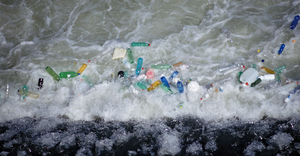New York City Bans Polystyrene Containers, Requires Some Food Waste Diversion (Updated)
New York City has passed a ban on Styrofoam containers and a law requiring large food waste generators to compost that material.
The city council agreed to ban the sale of single-service food items packaged in polystyrene, according to a news release from New York Mayor Michael Bloomberg. It is scheduled to take effect in July 2015.
“This legislation not only eliminates a product that cannot be recycled in New York City, it is a giant step forward in the city’s efforts to recycle organic waste,” he said. “Foam pollutes the waste stream, making it harder to recycle food waste as well as metal, glass and plastic.”
Manufacturers do have a period where they can try to prove to the Department of Sanitation commissioner that the polystyrene foam is sortable and does have recyclable markets, and therefore it could be considered recyclable.
The city council also agreed to require the city’s largest food waste generators to separate food waste and have it hauled to a composting facility. It also will take effect in July 2015.
Bloomberg called the vote “a significant step towards our PlaNYC goal of diverting more waste from landfills.”
The city is looking to double its recycling rate to 30 percent by 2017.
Two organics-related trade groups endorsed New York City’s move.
"With the passage of this initiative, (New York City) is taking a bold and decisive step toward establishing a sustainable environment for its citizens. This move will benefit generations to come," said Lori Scozzafava, executive director of the Bethesda, Md.-based U.S. Composting Council.
"NYC's extraordinary action will be a shot of adrenaline to the growing biogas and compost industries which are ready, able and willing to manage organic wastes as a resource,’ said Patrick Serfass, executive director of the Washington-based American Biogas Council. “This new policy fulfills a fundamental need for biogas and composting project development: a predictable and reliable source of organic feedstocks.”
About the Author
You May Also Like

